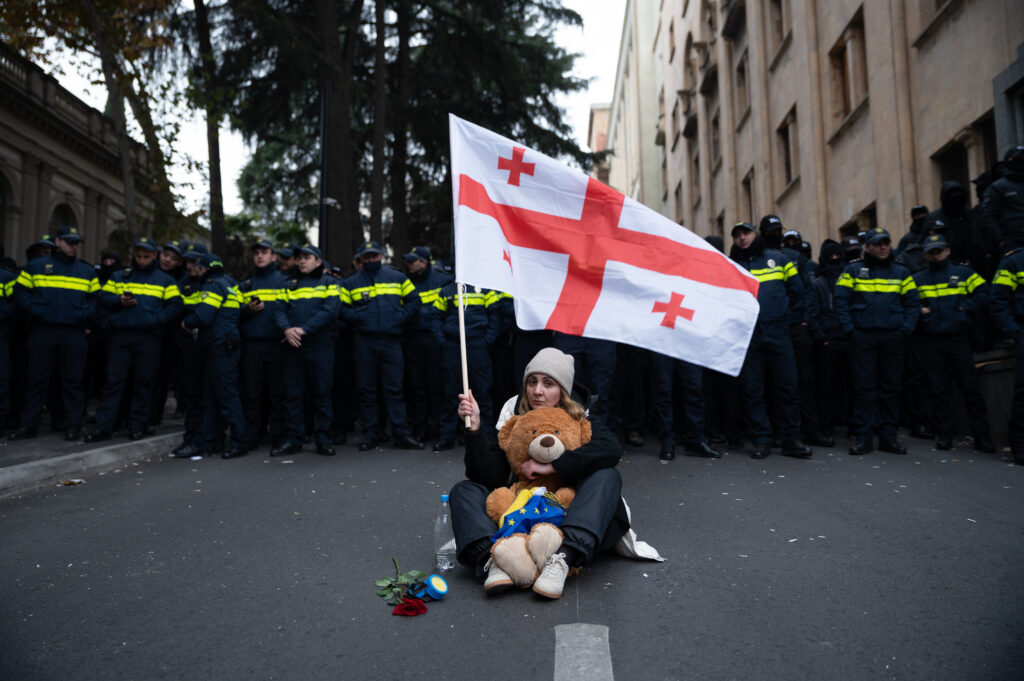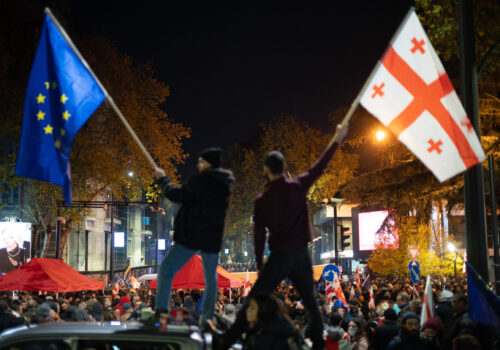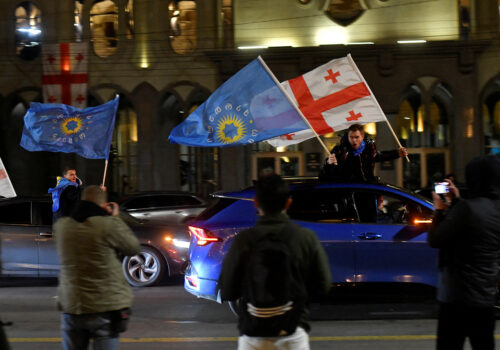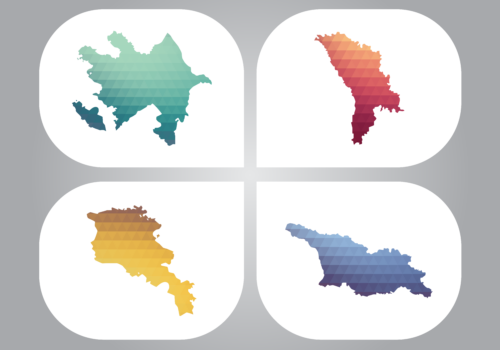On the cold, damp morning of November 25, around two thousand people held a gloomy protest in front of Georgia’s parliament building. As ultimately unnecessary phalanxes of police protected the building, the determined last holdouts of Georgia’s once-huge protest movement were left to contemplate how they came to be so comprehensively defeated.
This protest, against what the opposition and the country’s president have called a rigged election, was meant to be big. The opposition called for people to take days off work and mobilize overnight to prevent the new parliament from convening.
Instead, what occurred in front of the parliament building was barely a protest. It was more like a funeral—and not a particularly well-attended one. The hundreds of thousands of pro-European Union (EU) citizens who filled the streets in the spring to protest the government’s crackdown on civil society largely elected now to stay at home.
Unless something drastically changes, it seems like the ruling Georgian Dream party will be able to consolidate some form of authoritarian governance and that the country’s EU membership hopes are in tatters.
But most painfully for pro-EU forces, Georgian democracy did not die heroically in a hail of Russian bullets, or under the batons of riot police. It appears to be dying because it’s too cold outside and Georgians are too depressed and nihilistic to resist.
How did this happen? And how did a Georgian Dream party seen as being a vector for Kremlin interests manage to win in a country that consistently polls as one of the most anti-Russian and pro-EU in the world? How does an election almost universally criticized as being insufficiently free and fair lead not to sustained protests but to passive acquiescence to authoritarian rule?
Like its role model of Viktor Orbán’s Hungary, Georgia demonstrates that defeating democracy is terrifyingly easy if you use the right tactics. The playbook will no doubt be studied carefully by would-be dictators across the world.
Here is how Georgian Dream stole an election and got away with it:
1. Find the Goldilocks level of election manipulation—not too much, not too little
Discussion of rigged elections often invokes places where the dictator wins by ego-boosting but comically large and improbable margins. But the key to modern authoritarianism is to nudge the scales just enough to win and still be believable. This requires using a range of methods that individually don’t seem significant but collectively get the regime over the line.
Georgian Dream is expert at this. Vote-buying is one such tactic. Stories abound of voters getting paid in exchange for their votes. But when that fails, intimidation is also very effective. Many polling stations had gangs of burly intimidating men present as “observers” but who in fact enforced the ruling party’s interests. The ruling party also had video cameras inside most polling stations, which is legal in Georgia. This was what Iulian Bulai, the head of the Council of Europe parliamentary observation mission, meant when he said there was a feeling of “Big Brother is watching you” during the election.
Combined with serious issues related to the secrecy of the ballot—the Organization for Security and Co-operation in Europe mission reported that “voter secrecy was potentially compromised in 24 per cent of observations”—this made for an intimidating environment.
There is also growing evidence of direct, brazen fraud alongside the softer methods. Statistical analysts have pointed to the presence of a so-called “Russian tail” in turnout patterns, which is indicative of fraud and multiple voting. Reports also abound of multiple voting using ID cards either taken or bought from other voters, an allegation recently corroborated by a whistleblower who claims that his team was paid to vote 163 times this way.
But the key to all of this is moderation. The regime did not rely on a single method. When caught red-handed (as in one case where ballot stuffing was caught on camera in southern Georgia) this enabled the authorities to hold up their hands and call it an isolated incident. The aim was not to emerge with a Vladimir Putin-style 80 percent or more of the vote, but to cheat just enough to boost the ruling party from the 40-42 percent the exit polls suggested to the 54 percent it officially got.
2. Embrace older, rural conservatives, and use their fears and homophobia
This is a tactic common for right-wing populist movements in many countries. From the Brexit campaign to Orbán’s Hungary, the playbook looks quite similar. But the version of it that works best in Eastern Europe adds extra emphasis on anti-LGBTQI+ attitudes. Before the election, Georgian Dream adopted a law that makes it a crime to spread what it terms “LGBT propaganda.” It has also taken advantage of the older generation’s weaker fealty to democracy and involves a close embrace of the country’s powerful and thoroughly Russian-infiltrated Orthodox Church.
Georgian Dream also used fear very effectively to mobilize older voters.
“No to War–Choose Peace” was a key ruling party slogan, and posters featured images of destruction in Ukraine juxtaposed with Georgian monuments to drive home the point. The message was very much one of “vote for us or Russia will invade again.” Georgians may not have much love for Russia, but there is little appetite for war.
3. Embrace the Kremlin . . . from behind an EU flag
Anyone traveling to Georgia during the election campaign would be forgiven for believing that Georgian Dream was the primary pro-EU force in the country. Their posters featured large EU flags and the slogan “Towards Europe with Dignity.” Despite constantly bad-mouthing Brussels and refusing to take the steps required for EU membership, Georgian Dream was careful to hide their amenability to Russian interests behind a patina of pro-EU messaging.
This message, although cynical, was not altogether false. Georgian Dream does see itself as part of a European project, albeit that of the European populist far-right represented by Orbán and the leader of the French National Rally party, Marine Le Pen.
The message gave ostensibly pro-EU but functionally anti-Western voters sufficient cover to vote in line with Russian interests without openly doing so.
4. Allow but ignore protests and free speech (unless it gets to a critical level)
A crucial difference between the new authoritarianism of Georgian Dream and the older version is the attitude toward free speech and protests. Old-style dictators do not allow any protests and seek to muzzle critical voices. Georgian Dream took the opposite approach of, to paraphrase Georgian Dream’s billionaire founder Bidzina Ivanishvili, letting them shout until they get tired.
During the spring, some of the biggest protests in Georgian history took place with hundreds of thousands of people in the streets to oppose the so-called Russian law, referred to this way by its detractors in reference to its origin as a piece of Russian legislation. The law demanded that civil society organizations register as nefarious-sounding “vectors of foreign influence” and was judged by the EU as being incompatible with membership.
For months, protests ground Tbilisi and other major cities to a halt. The regime occasionally responded with police brutality and the use of “titushky” thugs to beat up protesters. But overall, they allowed the protests to continue until they ebbed by themselves, as thoughts turned both to the summer holidays and to the October elections.
Ivanishvili was proved right. When the elections came, there was no more energy. The youth, having seen their spring protests fail, largely shrugged their shoulders and gave up. The government managed to survive by merely ignoring, rather than cracking down on, protesters. Particularly problematic individuals were singled out for arrests or beatings by regime goons, but these could be dismissed as isolated incidents.
5. Steal hope from the youth and encourage them to emigrate
The youth in Georgia, as in most places, are the main engine of social protest. They were the driving force behind the spring protests and were expected to form the backbone of postelection protests. But Gen Z are, by and large, missing in action on the streets of Tbilisi.
Talk to young Georgians and the overwhelming message one hears is one of hopeless resignation. Most dream of individual escape through emigration rather than collective liberation.
This is partly a result of the highly individualist culture that the low-trust, low-tax, Wild West model of capitalism in Georgia has produced. A once proud communitarian, neighborhood-oriented culture has been replaced by atomization and dog-eat-dog competition. This is true for everyone. But, unlike older generations, the youth has never experienced anything else and so tends to look for ways to run away rather than cooperate to win change.
As a result, institutions that serve as backbones for social movements in the West, such as trade unions and community campaign organizations, are weak and distrusted by young people in Georgia. It is difficult to build a revolution through Facebook alone, which means that there is a lack of coherent leadership or organization.
But the government itself has done everything it can to sow despair and hopelessness in the youth. The more young people give up and leave, the fewer votes any change-oriented alternative is likely to get.
6. Be corrupt, but also spread just enough money around to keep key groups quiet
Georgia has always been stuck between its national political aspiration of joining Europe and a stubborn economic reality that binds it to Russia. Despite preferential access to the EU market, Georgia doesn’t produce anything Europe wants to buy. Russia, however, devours many Georgian products, such as wine. The influx of Russian tourists and shady and potentially sanctions-evading “investment” has also created a wealthy elite dependent on financial flows from the north.
This inflow of wealth may not be benefiting ordinary Georgians, who still overwhelmingly live in or near poverty. But it is appearing in statistics, with Georgia currently enjoying double-digit economic growth. This extra money buys the support of some and the acquiescence of others.
Figures close to Georgian Dream control many of the major businesses and especially the dubious financial flows from Russia. This, combined with its control of the resources of the state and billionaire Ivanishvili’s net worth of a fifth of the country’s gross domestic product, gives it huge patronage.
Georgians may love Europe in their hearts, but their pockets (at least for a part of the elite) are being filled with Russian rubles.
7. Have an incompetent opposition
The failure of the protest movement was not merely a function of superior government strategy. It was also one of abject incompetence on the part of the opposition.
The opposition did not decide on an approach to the election until the last minute, with talks on alliances ongoing until just weeks before polls opened. When they did eventually consolidate into four major blocs, their campaigns were weak and generic. The biggest of these blocs, Coalition for Change, ran a poster campaign of generic images and the meaningless slogan “The future is yours.”
Opposition leaders barely bothered to leave the comfort of the major cities. And they appeared to spend more time lobbying in Washington, DC, and Brussels than they did talking to voters. This played into the government’s narrative that the opposition were all elitist “foreign agents” who held ordinary Georgians in disdain.
The continued presence of figures from the similarly authoritarian, albeit more pro-Western, previous government among the opposition was another hindering factor, albeit less so than in previous elections. The specter of a return to power of imprisoned former President Mikheil Saakashvili, while increasingly far-fetched, remained sufficient for a subset of voters to stay loyal to Georgian Dream.
But most shockingly of all, despite having spent the pre-election period warning about the potential for fraud and manipulation, the opposition appears to have been caught completely unprepared when the results came in. Opposition leaders made a statement refusing to recognize the results and then spent the next few weeks dithering while both international attention and passion among the Georgian public evaporated. The weeks of excuses and staggering incompetence merely served to convince the public that the battle was hopeless.
Alex Scrivener is the executive director at the Democratic Security Institute, an independent, nonpartisan think tank based in Tbilisi, Georgia.
Further reading
Tue, Nov 26, 2024
Abandoning Georgia to the Kremlin would be a big geopolitical blunder
UkraineAlert By
Georgia is far from a lost cause, but it will require bold Western leadership to prevent the country’s capture by the Kremlin, writes Zviad Adzinbaia.
Sun, Oct 27, 2024
Experts React: Georgia just concluded a contested election, with the country’s future at stake. Now what?
Experts react By
After Saturday’s contested election in Georgia, our experts share their thoughts on whether the ruling Georgian Dream party will pull Tbilisi further toward Russia and how the West should respond.
Thu, Oct 17, 2024
Information warfare in the South Caucasus and Moldova
Report By
The four countries that are the focus of this report— Armenia, Azerbaijan, Georgia, and Moldova—navigate a complex geopolitical landscape. This complexity is reflected in their information spaces. Their collective legacy bears the indelible imprint of Soviet imperialistic rule, yet each is marked by a distinct identity and national trajectory that defy collective generalizations as mere […]
Image: Georgia, Tbilisi, 2024/11/25. A woman waves a Georgian flag in front of the police, who are guarding the entrance to the parliament. As the first session of the newly elected Parliament is scheduled for today, November 25, members of opposition parties have announced their intention to boycott it. Numerous protesters are demonstrating outside the Parliament entrance, where some spent the night. Photograph by Maurizio Orlando/ Hans Lucas. Georgie, Tbilissi, 2024/11/25.



